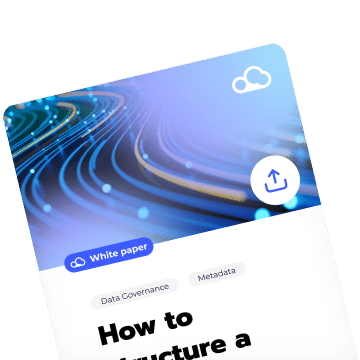As organizations grapple with increasingly vast and complex datasets, the need for effective frameworks that ensure data quality, integrity, and compliance becomes paramount. Data contracts can help organizations create a more dynamic approach, reshaping the way enterprises navigate the intricacies of data governance.
In this article, we delve into the realm of data contracts and unravel their transformative potential, offering five key insights that illuminate their role in optimizing data governance.
From fostering data transparency to enhancing regulatory adherence, these insights shed light on the ways data contracts are emerging as indispensable tools for organizations seeking to harness the full power of their data assets while navigating the challenges of the digital era.
What is a data contract?
A data contract is a formal agreement outlining the terms and conditions for data usage, sharing, and management. It specifies the requirements for accessing or using data within an organization or between entities.
Data contracts are also instrumental in establishing data quality standards – They set clear expectations between data producers and consumers for accuracy, formatting, and reliability. This aspect is vital in building trust and facilitating smooth data exchanges.
Furthermore, data contracts play a pivotal role in data governance. They guarantee that all parties involved in data handling adhere to the same standards and practices. This alignment maintains data integrity, adheres to compliance standards, and safeguards sensitive information.
In architectures like data mesh, data contracts facilitate decentralized data governance. They allow for autonomous control and management of data across different domains while adhering to governance policies. This decentralized approach empowers individual teams, improves data agility, and promotes a coordinated environment for data handling and usage.
Critical elements of effective data contracts
An effective data contract contains and addresses these critical components:
- Clarity: Expresses terms clearly to eliminate ambiguity
- Data ownership: Determines who owns data to prevent future disputes over authorized use
- Usage rights: Specifies permissions for using data, including sharing, modifying, or reselling
- Compliance: Secures adherence to relevant laws and regulations, such as GDPR and HIPAA
- Schema: Defines data’s structure, including its organization, format, and storage
- Semantics: Interprets data’s meaning consistently and universally
- Service level agreements: Specifies standards for data quality and availability
- Metadata: Provides context – the who, what, when, where, and how – for data.
Demonstrating how these elements operate in a healthcare environment, a data contract would:
- Clearly state (clarity) that a research firm owns patient data (data ownership).
- Specify that the data is available for research purposes but not commercial advertising (usage rights).
- Mandate conformance to HIPAA regulations to protect patient privacy (compliance).
- Dictate how patient data is structured, e.g., age, diagnosis, and treatment (schema).
- Provide universal definitions of medical terminology (semantics)
- Guarantee weekly data updates (service level agreements)
- Provide details about the data, like the source hospital and anonymization dates (metadata).
Optimizing these elements creates a secure, transparent, and efficient data management environment.
Overcoming challenges in data contract management
There are many hurdles involved in constructing effective data contracts:
- Complexity & ambiguity
- Simplify language
- Compliance with evolving laws
- Regular legal reviews and revisions
- Lack of standardization
- Adopt industry standards and best practices
- Version control difficulties
- Use version control systems for consistency
- Technological challenges
- Leverage contract management software
Navigating the complexities of data contracts involves leveraging best practices. For example, using straightforward wording prevents complexity and ambiguity, and regular legal reviews ensure ongoing compliance with evolving regulations.
Adopting industry standards and best practices addresses standardization challenges. Additionally, implementing robust version control systems provides systematic tracking of contract versions.
Contract management software effectively tackles the technological challenges of data contracts by automating contract administration, ensuring that contracts are continually updated to reflect new regulatory requirements.
Streamlining data governance
Well-structured data contracts are essential for efficiently streamlining data governance. There are many ways data contracts can bolster data governance and support a compliant data management environment, including:
- Efficient data utilization: Data contracts precisely define how and for what purposes data can be used. For example, a contract may specify that a dataset is available for analytics but not for marketing. This clarity prevents the misuse or unauthorized use of data.
- Rapid decision-making: Clear contract terms enable faster data sharing and usage decisions. For instance, managers can expedite approvals without extensive reviews if a contract explicitly allows third-party data sharing.
- Uniform data handling practices: Data contracts ensure consistent data handling practices organization-wide. For example, standardized data privacy terms in the contract align processes across all departments.
- Simplified compliance: Data contracts, aligned with regulations such as GDPR, act as benchmarks, simplifying compliance. These contracts guide legally compliant data handling, facilitating easier auditing and reporting.
- Mitigating operational risks: Contracts defining data ownership and usage rights reduce the risk of breaches and legal issues. For example, contracts describing who can access sensitive data prevent unauthorized use and data leaks.
- Building trust through clarity: Well-defined contracts foster trust among stakeholders by governing data sharing and usage. Clarity regarding security and the proper use of data removes doubts for all parties.
Enhancing transparency, privacy, & security
Data contracts are vital for upholding data transparency, privacy, and security. For instance, in our healthcare example, the contract’s terms clearly outline how each aspect is managed and protected:
- Data transparency: The contract specifies that patient data is solely for research purposes but not commercial advertising. This specificity enhances transparency by clearly defining the permissible uses of the data. Such clear rules ensure that patients are fully aware of how their data is utilized.
- Upholding privacy: The contract complies with HIPAA regulations, mandating stringent protection of patient privacy. It provides detailed guidelines on accessing, using, and sharing patient data, thus ensuring compliance with patient confidentiality and privacy laws. Such adherence is critical in healthcare, where handling sensitive patient information demands the highest level of care.
- Robust security: The contract details specific protocols for managing patient data, including encryption, access controls, and regular security audits. These are crucial for preventing unauthorized access and data breaches, thus safeguarding sensitive healthcare data against potential threats.
Data contracts are vital for maintaining superior data transparency, privacy, and security standards in healthcare: They establish a definitive framework for the use of patient data, ensuring all handling and processing are conducted responsibly and ethically.
Optimizing data contracts for evolving compliance
Organizations must optimize their strategies to respond to and reflect changes in numerous regulations, including:
- California Privacy Rights Act (CPRA): Introduces enhanced consumer privacy rights and stricter data handling and storage guidelines
- GDPR: Strengthens individual data rights and requires more stringent data deletion policies
- Asia’s Data Protection Reforms: In Singapore and Japan, revisions to data protection laws are mandating stricter data breach notifications and heavier penalties for non-compliance.
These and other evolving regulations present significant compliance challenges. Optimizing and updating data contracts to align with these modifications is necessary to avoid penalties and uphold trust.
Strategic optimization of data contracts
Managing data governance to protect data privacy and integrity demands continuous vigilance. As obligations in this area increase in number and complexity, the need for automation intensifies.
To meet these evolving requirements effectively, data contracts must be:
- Adaptive: Continuously revised to reflect global changes
- Compliant: Rigorously adhering to laws governing data usage, storage, processing, and sharing
- Forward-Looking: Incorporating advanced technologies, such as AI, for proactive compliance management
The role of legal expertise in supporting data contracts is crucial. Regular consultations with legal professionals maintain alignment with current legal standards, and integrating technology, particularly AI, also provides real-time insights and predictive analysis. Automating your processes leads to prompt contract adjustments in response to swift-changing legislation.
Leveraging AI in data contract management
DataGalaxy’s AI for data governance offers a glimpse into how artificial intelligence can significantly optimize data contract management.
- Automated catalog management: AI tools streamline the categorization and tagging of data, which is vital for keeping contracts accurate and up-to-date
- Data classification and compliance: AI assists in classifying personal data and compliance with data protection regulations, a key aspect in contract formulation
- Business glossary automation: AI facilitates the automatic generation and updating of Business Glossary items so that contracts align with the latest business terminologies.
- Collaborative quality control: AI uses collaboration to assess and enhance the quality of written content in data contracts. This involves reviewing and refining the contract descriptions, terms, and conditions
These AI-driven capabilities showcase how technology can transform data contracts. The power of automation makes AI integral to modern data governance by providing efficiency and accuracy.
Actionable insights for effective data contract implementation
Data contracts are indispensable for data management and governance, as they serve two purposes:
- They operate as a framework that dictates how data is shared, used, and protected
- They establish clear guidelines, ownership, and accountability for data through agreed-upon standards and practices
This framework is vital for maintaining data integrity and compliance with regulatory requirements, and data contracts are fundamental tools for orchestrating efficient and responsible data handling.
To effectively implement and optimize your contracts, consider these actionable insights:
- Regularly review and update: Monitor and update contracts to align with changing laws and organizational needs
- Educate and engage with stakeholders: Teach and interact with all stakeholders regarding their roles and responsibilities
- Use technology: Leverage technology, including AI, to manage contracts efficiently Software solutions maintain contracts in lockstep with ongoing legal updates
- Consult legal experts: Regularly review existing and pending regulations with legal professionals, and update your contracts to reflect changes in compliance-related activities
- Customize: Tailor contracts to address your organization’s unique data management needs
Conclusion
It’s time to take action: Standardize your data processes, review your data contracts, and embrace the latest technological tools to safeguard your data assets and enhance regulatory compliance.
—
Still have questions about data governance? Turn to DataGalaxy to create your company’s data lineage mapping, develop a standardized business glossary, and much more! Check our calendar and select a date that works for you. Jumpstart your free 15-day platform trial access & start making the most of your data today!





